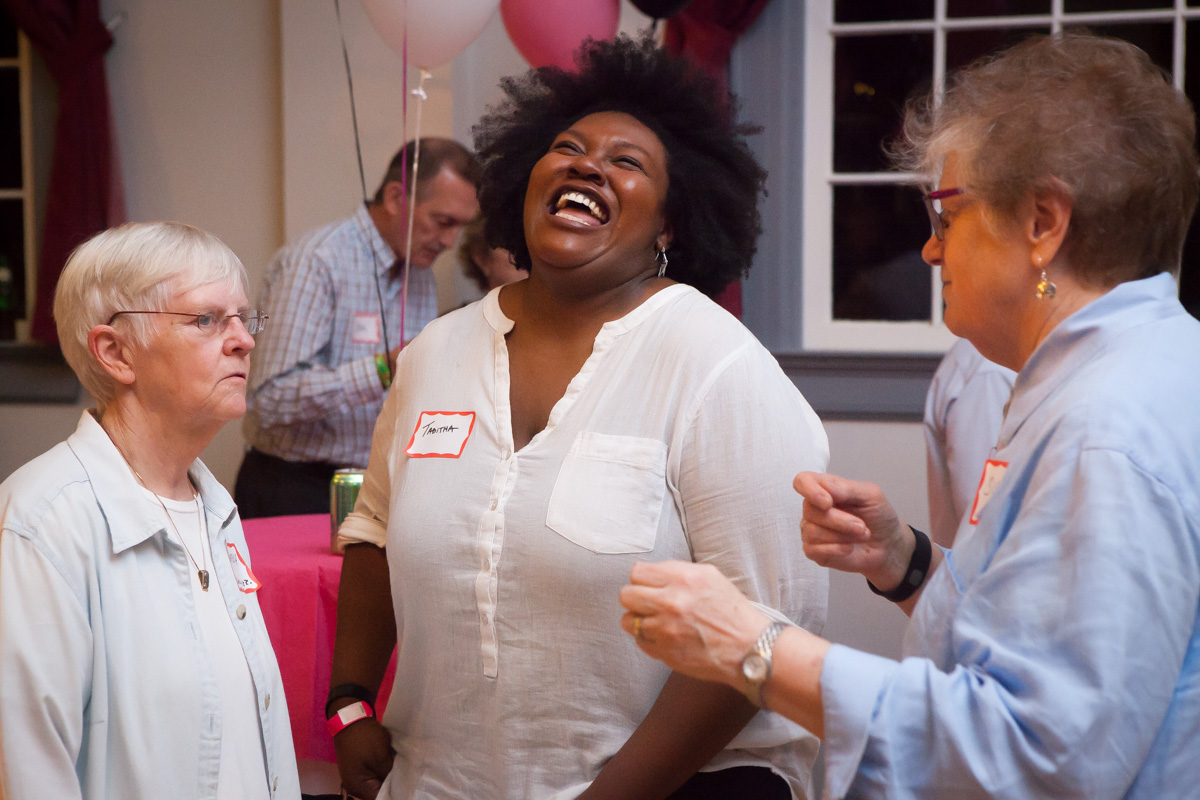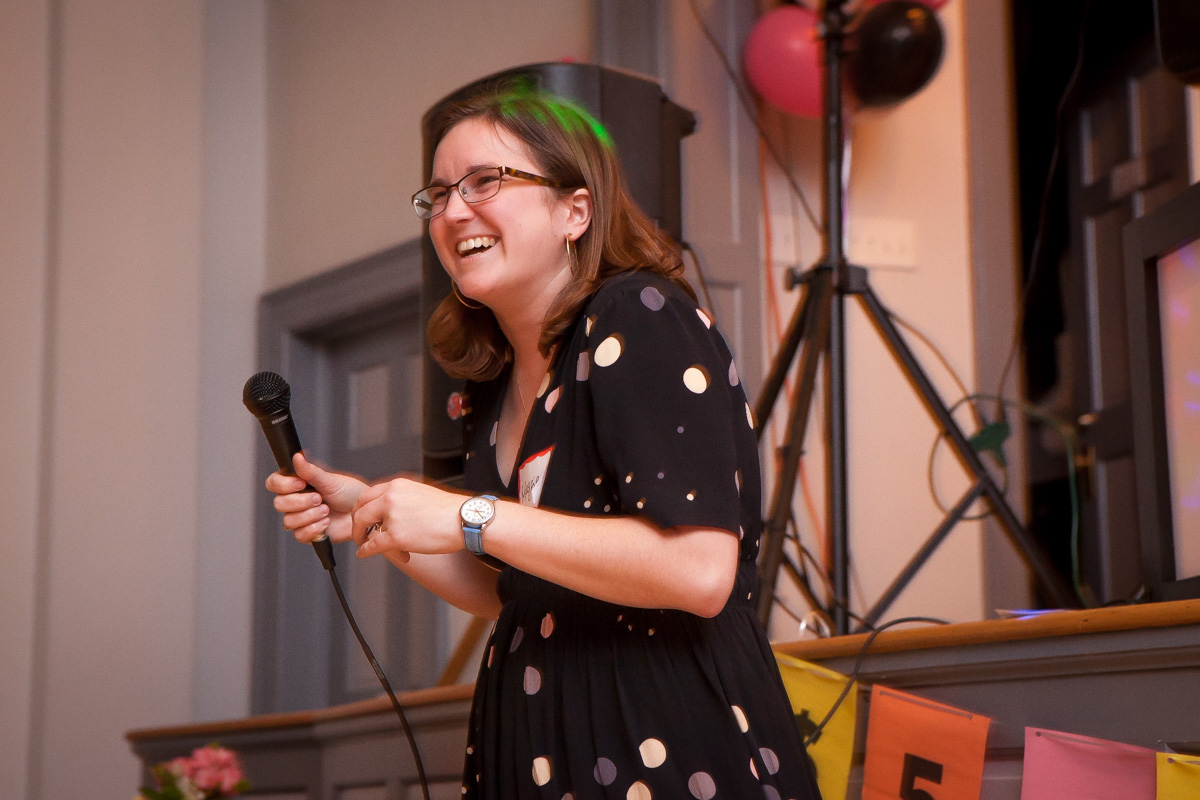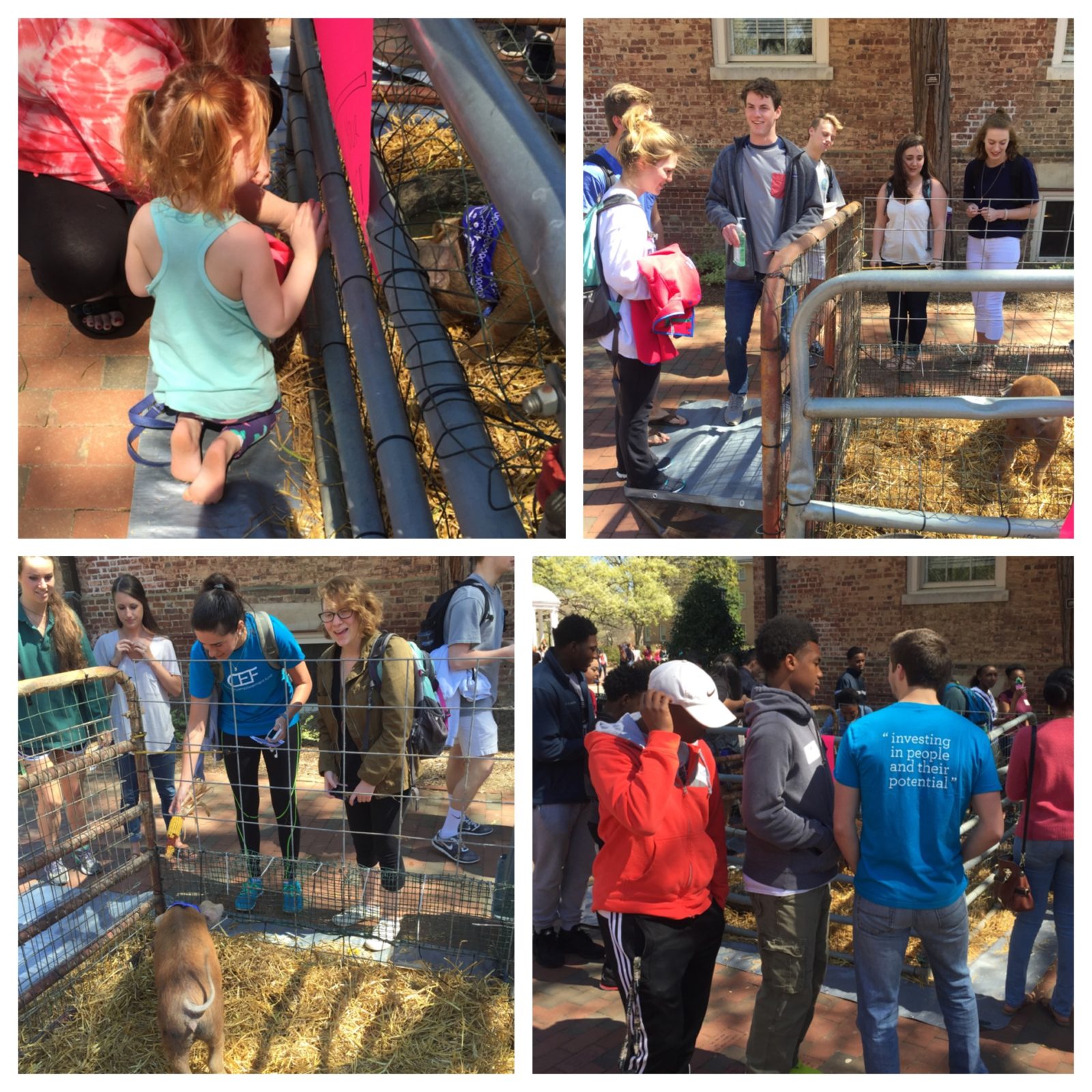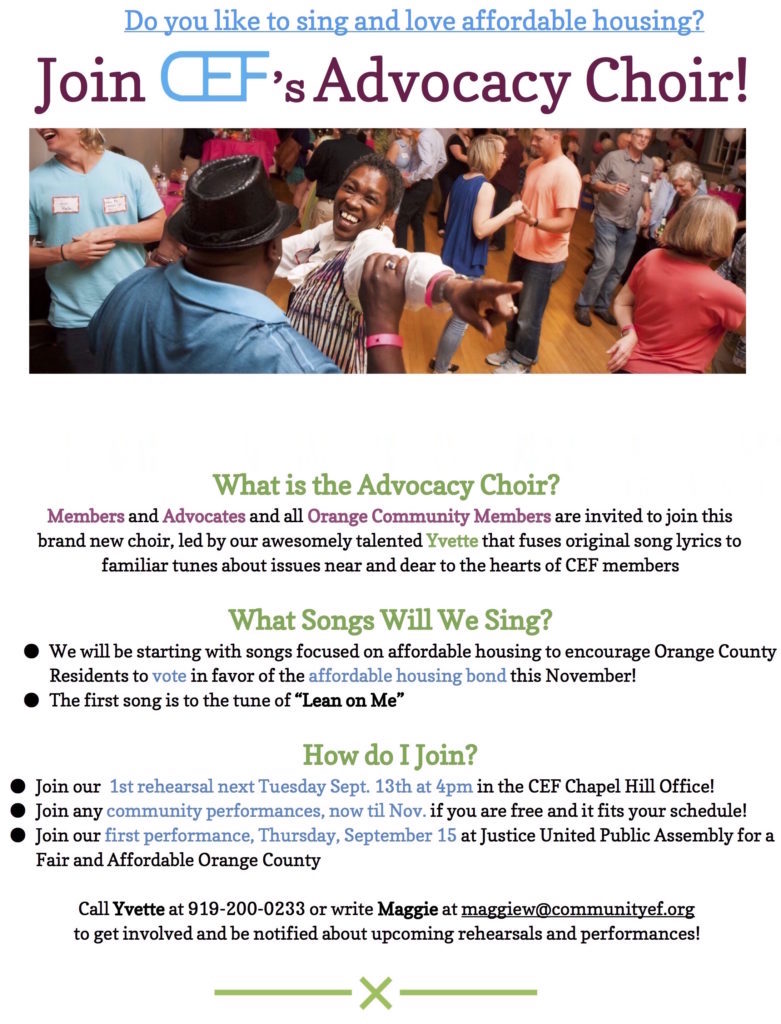
Archive | General
Follow Maggie to our New Chapel Hill Office!
We’re excited about this move for a couple of reasons:
1. Twice the Size! It’s way bigger than our current space, almost double the size. This allows us to co-locate and share the space with partner organizations. We are currently looking for organizations interested in sharing this great location.
2. Five-Year Lease! This will also be, at last, a longer term home for the CEF family in Chapel Hill. We’ve signed a five-year lease and are very much looking forward to settling into this space.
How You Can Help:
1. Volunteer Your Time!
If you’re able to help us pack or move boxes, we need help!
Click to Here to Sign-up
2. Donate!
With this big move, we need your support now more than ever, and we still need to raise at least $1,000 to reach our all-or-nothing challenge grant! Donate before May 31st and your gift is doubled by the Stewards Fund!
Click to Donate
[Learn more about our Stewards Fund and Double Your Donation!]
Piggy Bank Bash a Smash Hit
The doors of the historic Murphey School yawned on a ballroom full of tables decorated with pink tablecloths and adorned with ceramic piggies. The tables themselves were set off to the sides as the beautiful wooden floor awaited a workout. Guests trickled in and before shag instructor Don Bunn began calling out steps and counts on Friday night, the crowd had swelled. Two rows of face to face couples filled the room, and clumsily figured out the frustrating footwork. As soon as folks had nailed down the basic one-two-three, one-two-three, one-two, Don threw in a spin that had everyone disoriented and maybe a little dizzy.
Even though some were perhaps more light on their feet than others, spirits were high all night. The shag dancing gave way to an assortment of modern moves as DJ Butta Brown exchanged beach music for pop and hip hop hits.
The brief interlude for remarks from staff members and alumni halfway through the night had everyone drawn close and enjoying that tangible familiarity that is so common in CEF relationships. Alumni recounted with gratitude the part CEF had played in their story, and the fondness with which they regard their Advocates and the larger organization. Staff also used the Bash as a moment to celebrate the fact that Members have now saved more than $500,000 in their Safe Savings Accounts.
All told, about eighty people attended the Piggy Bank Bash and helped us raise $4,000 to grow our programs and continue working alongside Members in Chapel Hill and Durham. A huge and hearty thanks to all of those who came or supported the event if they weren’t able to come!
Special thanks to Jay Miller for hosting us at the Murphey School; CEF board members, Advocates, Members, and Holly West for their help in organizing and planning the event; Bandido’s, Cholanad, Vimala’s, Med Deli, and Hillsborough Wine Company for catering delicious food and refreshments; Balloons and Tunes for the decorations; and, last but certainly not least, DJ Butta Brown for the spectacular music that kept us all moving!
Little Pig Barnstorms UNC’s Campus
The courtyard in front of the UNC Campus Y was abuzz around lunchtime as students, staff, and visitors were delighted to discover an oinking four-legged visitor with a curlicue tail. “Darling,” as the unnamed piglet is affectionately called by her owner, elicited many yelps of excitement from passersby surprised by the decidedly out of place farm animal.
Chapel Hillians of all varieties stopped and knelt to pet “Darling,” and feed her grass and dried corn from her farm 30 miles down the road in Moncure, North Carolina while CEF Advocates passed them fliers and publicized this Friday’s Shag Dance fundraiser, the Piggy Bank Bash.
“Darling” is the perfect mascot for the Piggy Bank Bash. She became more social and friendly throughout the day as she realized that her adoring fans were there to provide sustenance and attention. At CEF, we know that financial independence is incumbent upon a well-“fed” piggy bank that gets lots of attention. Similarly, as an organization, we rely upon the offerings of friends and partners to continue operating.
We hope that you’ll slap on your overalls and slip into your dancing shoes on Friday for the sake of the piggy bank. A night full of dancing, food, friends, and fun is a Darling way to help nourish CEF and help us spread the word about the virtue of piggy banks to the Durham/Chapel Hill communities.
Saver Feature: Chapel Hill Member, Darryl
In January, CEF Members crossed the $500,000 mark, meaning that Savers have put away more than $500,000 in their Safe Savings Accounts since the program started in 2010. They’ve used those savings for rent, security deposits, utilities, transportation, food, and much much more.
We thought this would be a nice opportunity to check in with a CEF Saver about his goals and CEF experience. Chapel Hill Member Darryl enthusiastically agreed to talk! He’s from Jamaica, Queens, New York and has been a CEF Member since the fall of 2014.
Why do you save with CEF?
I save because if something comes up with my car, like tags or taxes… or if I’m going to take a trip, I know this money is over here.
It’s somewhat like an emergency fund. It’s some money that I have automatically taken out because I save better when it comes directly out of my check.
With my savings here, you get 10% [matched] up to $2,000. Even Matt (Darryl’s Advocate and Chapel Hill Advocate Program Coordinator) has got me putting money in my savings account also. So I’ve got some in my savings account, some in my Safe Savings Account here at CEF, and some in my safety deposit box. I’ve gotten in the habit of putting up money.
I’m getting ready to take a trip and that’s what I’m going to use the money from CEF for. I’m going to go home. I’m going to New York in April.
Would you recommend the Safe Savings Account to other people?
Yea! It’s helpful to have someone help you decide if it’s a good idea or not [to withdraw money]. If you get with an Advocate, especially once they get to know you, they know if you really need the money and if it’s really a good decision you’re making or if it’s not! They’re still going to give you your money, but they’re going to help you with it — they’ll help you make good choices about spending that money.
Do you have a favorite CEF memory?
Well Mike, the guy who teaches Opportunity Class, he’s a character. I mean Saturdays I love to go because I’m just around the guys. They bring new guys in. It’s Mike, he’s like a comedian. When he teaches the class, he makes it interesting! That’s every Saturday. I don’t have a favorite moment because every time I come here something’s going on.
What does financial independence mean to you?
I came here because I needed a couch and I was on a fixed income. And when I came here I had started working. The thing is with CEF, I learned from the class that I didn’t know anything about establishing my credit as far as getting a secured credit card when my credit wasn’t any good. When I came here my credit was poor, now it’s fair.
So it is a good thing that I did come here because they’re teaching me ways to handle things to better myself to be more financially independent. I bought a car since I’ve been here. Matt helped me get my car refinanced.
This place right here has helped me out tremendously and I’m grateful for CEF! I’m grateful for not just Matt. It’s the relationships that are established here, also. Matt knows me! He got me to where I don’t carry cash around like I used to; I don’t whip my card out every few minutes.
How did he help you do that? What do you attribute those new habits to?
It helps me save money! The first day I met with Matt, I said that I spend money all the time, you know going to Walmart and stuff. And he said, “don’t carry cash around and don’t just whip your card out. If you don’t need it, don’t get it.” He helps me out and he gives me good encouragement.
What do you want the CEF community to know about you?
I’m a recovering addict. So when I come here I’m around guys [who are experiencing addiction], and we help each other because it’s not about me trying to make them do something they don’t want to do. But, it’s encouraging when you’ve got somebody who came from where you came from. I speak about that in Opportunity Class. If it’s got anything to do with the discussion I can talk about how I used to be on drugs and alcohol real bad. And today I do better things with my money and I help other people in the process. That’s what we do, we help each other.
Meet CEF Member Eva
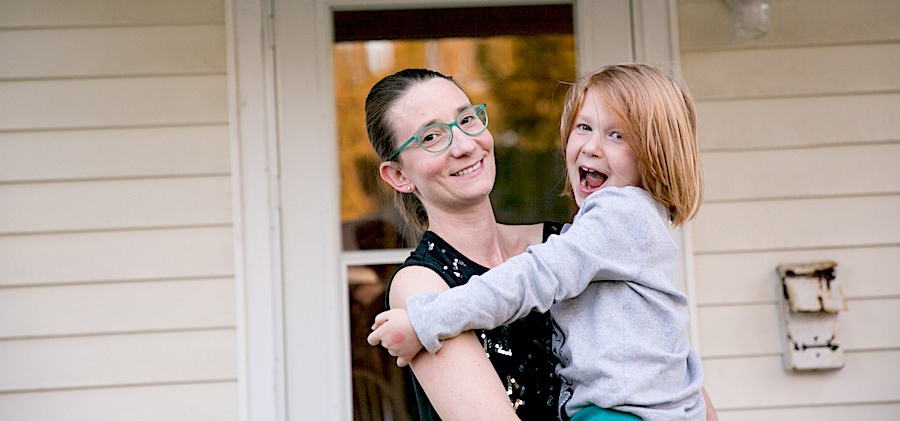
Eva and Vivian in front of their new home!
“Can I tell you how CEF really helped? It was one place that I could go where all the things could be addressed which were really overwhelming. I could come to you and we could break it down and work on every piece of it that I needed to work on.”
We connected with Eva while she and her daughter were staying at the women and children’s shelter in Chapel Hill. “My daughter’s name is Vivian and she is six years old and she’s in first grade and she’s totally my main motivation. She’s what has pushed me to not give up, to keep going.”
Vivian is a bundle of delight, ready to tell you how she taught her herself to ride a bike. Eva worked hard to make sure Vivian had a sense of normalcy while the two were living at the shelter for seven months, arranging play-dates or visiting the children’s museum.
Eva partnered with her CEF advocates to connect to resources and find housing. Now with a cozy house for the two of them, Eva proclaims, “This is the first time that I have ever been in a real home that was my own, period. Either I was living with my parents or I was living with someone that I was dating, or I was paying someone $100 to stay on their couch when I was in college or I was taking out loans to stay in a dorm.” Eva graduated from UNC-Greensboro with a major in Dance, though laughing she says “I only dance in the living room now.”
Eva and Vivian’s move out of homelessness was a struggle. The affordable home they found took months to be repaired to code, leaving the two sleeping on friends’ couches for a month after their stay in the shelter. Of CEF she shares, “I just was generally overwhelmed, so it was nice to know that there was somebody out there who had my back.”
What does their new, stable home mean for Eva and Vivian? “This is the first time I’m going to have the chance to parent how I want to parent.” And Eva has the dreams of a devoted mother for her daughter’s life… “I want her to have self-worth, and I want her to be able to support herself fully, that’s important to me, to feel good about herself… I guess the things I really want for her are more like personal qualities. Whatever goals that she has I will support her, but what kind of human being she is, that is the most important for me.”
Eva has so much to be proud of. “I’m worlds away from where I was. Now I’m gaining independence, getting to be self-supporting.” Her CEF team will continue to have her back!
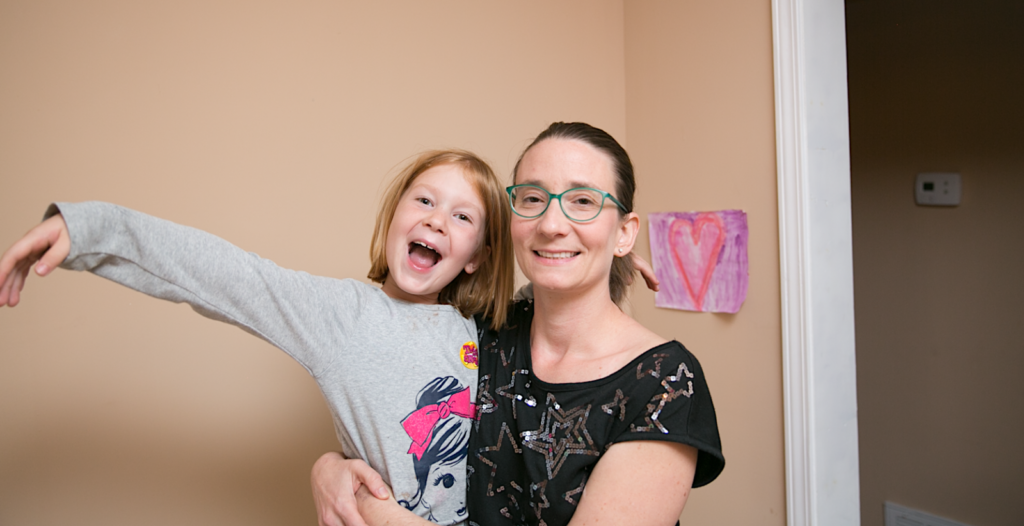
Channa Pickett & Duke’s Office of Durham & Regional Affairs (DARA)
Fostering Community Care in Durham and the Triangle
CEF received a $5,000 Community Care Fund (CCF) grant through the Duke University Office of Durham and Regional Affairs’ “Doing Good In the Neighborhood” (DGIN) program in October of 2015. We sat down with Channa Pickett, Senior Program Coordinator for Community Outreach, Engagement, and Evaluation, to talk about the CCF grant, her work at DARA, and her story.
When Channa Pickett joined the Duke University Office of Durham and Regional Affairs (DARA) in 2008, she was charged with building and running a grant-making program for Doing Good in the Neighborhood, Duke’s employee-giving campaign. Doing Good in the Neighborhood (DGIN) was designed to connect Duke employee donors to an array of giving options that impact the Durham community. Today, Duke employees can choose to donate to five options — neighborhoods, youth, schools, health, and the Community Care Fund — in addition to being able to donate to the United Way.
CEF received its grant through the Community Care Fund, which provides funding to Triangle nonprofits that present “strong and innovative proposals.” CEF will be using its grant money to deliver and continuously improve personalized one-on-one financial coaching to Durham residents, leveraging these efforts towards stable transitions from shelters into permanent housing for those experiencing homelessness and housing insecurity.
Community investment, especially in local schools, is what former Duke President Nannerl Keohane imagined when she created the Duke-Durham Neighborhood Partnership in 1994. “I really believe that Duke has in its heart and in its mission an investment in the community,” says Pickett, “and I think that happens in hundreds if not thousands of ways.”
For over two decades, Duke has bolstered communities and organizations in Durham and beyond through targeted giving and organizational support.
While raising money is not always an easy task, especially during a recession, Duke employees have continued to step up to the challenge raising $647,985 in 2015. Money raised through DGIN has been invested into high-impact programs and organizations that make our community a better place.
“It’s been an incredible experience watching the DGIN campaign grow over the past eight years,” Pickett reflected. “I’m always impressed by the generosity of my colleagues across the campus and health system.” Initially Pickett thought grant-making would be simple; however, she soon realized the unique challenges grant-makers face. “We feel a real sense of responsibility to our Duke donors to invest their money wisely,” Pickett says. “With so many deserving organizations in Durham, Wake, and Orange counties, we often face difficult funding decisions.”
In addition to her work with DGIN, Pickett oversees several Latino community outreach initiatives including Enlaces, a Latino youth outreach program for elementary and middle school students. “In 2008, as we started talking with school and community leaders, we heard the need for more support for our Latino community members,” Pickett recalled.
“We were seeing tremendous growth in our Latino Community,” she says, “yet language and cultural barriers prevented students and parents from accessing many school and community resources and fully engaging in the education of their children.” Partnering with El Centro Hispano, Pickett helped start Enlaces, a strengths-based program that better connects Hispanic students and parents to school staff and resources. The Enlaces team uses a holistic approach to meeting the needs of families and works to enhance communication and understanding among youth, parents, and school staff.
In an earlier interview, Maria, the mother of an Enlaces student at Rogers-Herr Middle School, said the parent workshops and the support of Enlaces staff have made a big difference for her family. “The meetings help me relate to and have more conversations with my son,” she said. “I’ve learned how to create a good studying environment at home, and I feel more connected with my son’s teachers.”
Through the years, Enlaces has expanded the focus from school navigation to parent leadership development and advocacy. It’s been exciting and very rewarding “to see parents go from calling us [Enlaces] for support to contacting the school directly, requesting their own meetings, and advocating for their issues,” Pickett reflects.
Now in her eighth year working for DARA, Pickett is excited to focus on cultivating youth leaders through Enlaces. “Our youth have a lot to say about their own experiences. We want to help them realize change on issues that impact their lives.” Pickett says that it’s “a pleasure and an honor to work in this office and to have an opportunity to invest in others as others have invested in me when I was a student at Durham Tech and Duke.”
We’re appreciative of Pickett’s efforts and of DARA’s generous support of CEF!
Member Services Coordinator, Jean Adler Stean
Jean Adler Stean is CEF’s newest hire. She is the Chapel Hill Member Services Coordinator and comes to CEF from the Durham VA Hospital, where she worked as a chaplain. She graduated from Duke Divinity School in 2013 and the University of Virginia in 2009.
She was kind enough to sit down for an interview on her first few months of work with CEF.
Tell me about your background
I grew up in Virginia Beach, but was born in New York and lived a whole bunch of different places. Virginia Beach is home though. I love the beach, and I love the ocean — it’s my soul place.
I’m married to John Stean, who works for the North Carolina NAACP.
How did you end up in divinity school?
I felt a calling to ministry and then worked during and after college for a community development nonprofit. The organization was called “Abundant Life Ministries” in Charlottesville, Virginia, and the idea was that you lived in and served in the neighborhood. It was less about programming and more about cultivating the resources that are already abundant in communities, and that community members really have the knowledge and power to help their community thrive.
Through that experience and through the experiences of college I was very interested in justice and community development and how that could work as a ministry. I realized that I didn’t know much of anything about ministry, so I should probably learn more about it.
So it was a combination of experience and wanting to learn more and keep doing that work.
What did you do after divinity school?
For two years, I worked at the VA Hospital in Durham as a Chaplain. The first year was my general residency, and then they had a new position open up for a mental health chaplain, working with folks who suffer from severe mental illness. I’ve always been very interested in mental health and found myself really drawn to it in chaplaincy work. It was pretty intense, but I think it’s another one of those callings. I think there are some people who just love to work in mental health, and I guess I’m one of those people.
It was challenging for a lot of the same reasons our work is challenging. You get people cycling in and out, who can’t really ever get well or heal, people who are struggling day in and day out, who have countless other circumstances on top of everything that trigger their mental health. I heard and saw the effects of oppression and poverty on health — mentally, physically and spiritually.
Why were you interested in working at CEF?
I was interested in CEF as an organization because of a lot of what I’d heard and knew from Janet (Durham Program Coordinator). It seemed like CEF was an organization that really cares about looking holistically at why people are in poverty. So, for example, we look at systemic injustices and systemic reasons for how people find themselves in the situations that they do, and we work to support both individuals in the moment and also work towards systemic change.
Why were you interested in being the Member Services Coordinator, in particular?
As you can probably tell from past experience, I like direct interaction with people. I love people, I love getting to know them, hearing their stories, and hearing about who they are. For the past two and a half years, I’ve been learning how to listen well to people. I was excited about the opportunity to keep that focus on working with individuals and supporting their unique needs and goals while also working to build partnerships and relationships to help the community as a whole. That’s what most intrigued me with the Integrated Services Center model. I was very much interested in how we can work to build connections and relationships across people and groups and institutions, in a way that can alter the landscape of our community for the better. It’s kind of like community development in a very specific kind of way.
Now that you’ve been on the job for a few months, how has it been different than you expected it would be?
Well, I found out very quickly that I have a whole lot to learn! The amount of information and resources y’all have collected in the database is incredible, and it’s a lot to know. I’m also discovering that resources and people and other organizations are constantly changing — that our community is constantly changing. So there’s always new information and people to learn about. It’s exciting in many ways, even if it can be quite confusing!
What I really appreciate about CEF is that we do talk about systemic issues, both within our community and within our organization. We’re self-reflective, and always willing to grow, even if it’s painful and tough. It’s not like CEF is saying, “we’ve got it all figured out, we know how to not oppress people with systems,” that’s near impossible. CEF is continually asking the questions and working to figure out how to better our services and improve ourselves as an organization.
What do you think is the biggest challenge this work will present to you?
I think sustainability. If I’m honest, some days can be very exhausting when you’re continually running up against systems and powers that you’re pretty powerless against when you’re working with Members. And you run into those a lot. Being in it for the long haul or sustaining oneself through that kind of work is tough, but doable.
What project are you most excited about in the new year?
I’m excited about continuing to get to know Members. I’d love to, in a general sense, really get more Members involved in more inner workings at CEF. They are so much the heart and soul of CEF, and I’d love for them to be involved in our community and continue to teach and shape us.
On a very specific point, I’m really hoping to get us some more robust legal resources. I think there’s been a gap here that was made apparent early on to me by some of our Advocates. So I’ve been following the connections as they come, and it seems like there are people in our community who are super excited about it as well. The resources are there, and we just have to tap into them. I’m tapping!
Tell me about a memorable Member meeting
In general, I think it’s just fun to get to know Members and to be able to call them by name, hear about their weekends, and know a little bit more about who they are and what they’re doing in the world.
One of my more memorable Member meetings was actually during a situation where I felt pretty powerless to offer tangible support. I met with a couple when they first came to Chapel Hill and they were homeless and didn’t have anywhere to stay that night. At that moment, I didn’t have many resources to offer them, which obviously is difficult, frustrating, and sad. But, I got to learn more about them in that hour and hear their story about how they got married and more about their family. I got to meet with them again recently, and it had been a while and they remembered me and I remembered them, and we were just kind of catching up about their holidays and getting to share about all the things that humans want connections with.
So, even though there are these monstrous barriers that can limit us in giving support to Members, sometimes I just have to say, “Whatever, barriers! We’re going to be human today.” That feels important to me. A lot of our hard work doesn’t always have the results that we want, but at the end of the day we can connect to someone meaningfully and that’s important to me.
Why do you think connecting with people is so important to you?
I really, truly love people. I think what all of us most want is to feel connected with and to feel loved by others. And in my work, I see how powerful it can be to have connections for myself and for other people — that a lot of healing takes place in that connection. And I’m really about healing, that’s what I want to be about in the world — for myself and for others. We could all use a lot of healing and I want to be a person who offers that, and I think connection is the way that I can offer that.
Member Story: Sue and Howell
Spend as little as five minutes with Sue and her son Howell Brown III and be prepared to fall immediately and deeply in love. Little Howell, with a thick Appalachian accent and black cowboy hat covering his head, talks in that lively way that only a 12-year old boy can about the RC cars that he races at Northgate Mall and his service dog Bo. He is the epitome of exuberance. He is one of those rare people you feel blessed to meet, who breathes in the same air as the rest of us, but then manages to breathe out pure joy.
Sue and Little Howell came to Durham when Howell was diagnosed with a brain tumor. They left everything behind at their home in Asheville, and were sleeping in hospital waiting rooms at first. Howell shares, “When I got diagnosed, we had to leave right away – no messing around.” After relocating to Durham, Howell and Sue were very fortunately connected with the Ronald McDonald House to live while Howell received his first year of chemotherapy and treatment.
During this time of upheaval and crisis, Sue ran into financial troubles. Howell’s oncologist encouraged Sue to “put everything on hold” while taking care of Howell through his treatment, meaning that Sue has been unable to work consistently. To help with bills, she took out a payday loan, not knowing the neverending debt trap the loan would lead to. Since then, Sue has received numerous threatening collections calls – and paid back her loans with exorbitant interest – all the while navigating the complicated health system and making sure Howell was receiving all the care that he needed.
Sue has been an amazing advocate for her son throughout his treatment – seeking out resources within the hospital and within the community that could support her son’s well-being as well as their future as a family. She learned about CEF when attending a resource panel offered by another local organization, and jumped at the opportunity to work with CEF to get her finances back in order.
Sue and Howell truly joined CEF as a family. Sue and Howell worked with their advocates to strive through their financial crisis as Sue focused on her son’s healing and treatment. Of CEF, Sue shares, “They’re helping me find hope by getting my financial security back… Before, we were struggling so much, and now I feel like I am breathing again.”
With CEF, Sue has opened a new account at Self-Help Credit Union, allowing her a fresh start with banking, and she is also working towards a personal savings goal through CEF’s Safe Savings Account. She has also connected to many local resources, filed back taxes, and better understood her credit situation. Her Advocates also help to investigate when she suspects she is receiving phone calls and emails that are financial scams. With her tireless CEF Advocates, “I can reach my goals,” says Sue.
And Sue has made this progress and tackled these issues concurrently and alongside traveling back and forth to Florida for special treatments for Little Howell, countless appointments at Duke Hospital, and dealing with news that is sometimes good and sometimes not what they hoped to hear. What’s more, going above and beyond super-mom status, she has found ways to give Little Howell the opportunity to be the exuberant, joyous, full-of-life child that he is, approaching a glimmer of normalcy, by doing everything from racing RC cars to attending Duke football games through the Ronald McDonald House.
Sue and Little Howell have been a joy to work with in CEF, and we are delighted to share a little bit about their journey here. As they reflect on their time with CEF, Little Howell shares, “I just hope we can do something for them some day, they’ve really helped us out a lot.” We hope he knows that they already have.
Meet Anthony: “CEF All-Star”
(Anthony sporting his CEF “People Helping People” hat in front of his new home!)
Anthony raised four boys as a single father – two his sons and two of his sons’ friends who he raised as his own. He was an All-American football star at Chapel Hill High and went on to coach football for 19 years. In his own upbringing and as a parent, Anthony emphasized “Hard work, showing them you can do anything, and family – I was always at their events, reading, football games, I was always there.” With all 4 of his sons now grown and successful in business and public service, you can tell when talking to Anthony that family is at the center of his life.
Anthony became homeless after a large lay-off at the assisted living facility where he was housekeeping manager. “I had an apartment, a car, and slowly I started losing those things.” After spending some time staying with family, Anthony moved into the IFC shelter.
(Anthony’s 2014 Holiday Party Graduation)
He shares, “I found out there was a lot of social help here in Chapel Hill. Of course CEF was one of the first groups that I was led to… I mean, I had become kind of down in life, things not going well for me, and thought nobody really cared about what happened to Anthony Sharp. But when I walked into CEF it just changed. The enthusiasm the college kids had, you know they’re wiling to help, and just the care that they had – that made me feel different about myself.”
Anthony began working with Karla, a CEF advocate and current senior at UNC. Karla shares, “In our first meeting, he had so many plans for himself, ranging from academics, finances, employment, business, and service. And of those things, I feel like he always emphasized the service he would perform.” Karla and Anthony built a resume, completed countless applications, and connected with legal services to address issues on Anthony’s background.
(Anthony goofing around with fellow CEF graduate Robert at the 2014 Holiday Party)
Anthony highlights that in his struggle to “defeat homelessness… you know it wasn’t just me or one group, it was the whole community that came together.” He engaged in Orange County Literacy programs, many groups that meet at the shelter, and all of CEF’s programs, including Opportunity Classes. As he accumulated certificates along the way, he began including those with all of his job applications – and it all paid off!
Anthony secured a full-time position at UNC with health insurance and retirement benefits, and quickly saved with CEF to move into an apartment of his own. But even more, “For me, I found out I was smarter than I thought I was… I found out how to live again. As a term I have heard a lot from others, I’ve turned out to be who I was really supposed to be.”
Anthony gives back way more than he received. “It has just been a great life change for me, and I want to give thanks to a lot of people, and my community most of all for showing me a different way to live. It’s just great to be able to give back to this cause in Chapel Hill of ending homelessness.”
(Anthony with State Senator Valerie Foushee at the ribbon cutting for the IFC at SECU Community House where he is a new board member — Anthony delivered remarks about his journey out of homelessness)


